SOCIAL INITIATIVES
Greenko is committed to practical and sustainable advancement in all areas of prevalence as part of being accountable towards our economic, environmental and social responsibilities. Social Responsibility is at the heart of our activities, we, therefore, conduct our business through standard partner engagements bringing about comprehensive development both socially and environmentally.
Renewable energy major Greenko group has unlocked global supply chain network to airlift critical oxygen support systems to India.The first of the five dedicated cargo planes landed in Hyderabad today with 200 large medical grade oxygen concentrators with 10 liters per minute capacity to aid in India’s fight against the deadly second wave of infections.
KT Rama Rao, Telangana Industries Minister along with Chief Secretary Somesh Kumar, Greenko Co-Founders Anil Chalamalasetty and Mahesh Kolli were present at the arrival of the cargo flight. Anil Chalamalasetty said, “This is first of the five dedicated cargo planes we are bringing in through the strong global supply chains that we have set-up in the last two weeks. Within the next 5 days, four more dedicated aircrafts will land in Hyderabad, Bengaluru and New Delhi with 1,000 such large medical grade oxygen concentrators."
"This will aid our medical teams in tier 2 and tier 3 cities for pre-ICU support and post-ICU stabilisation of patients and help combat the second wave of CoviD that has put severe strain on our healthcare infrastructure and support systems. We will continue our work to help the country and aid the efforts to fight the pandemic and have India again breathe freely.” Rama Rao thanked Greenko founders for their effort, and said, “Our first priority is to provide relief to the patients and avert this oxygen crisis as prudently and judiciously as we can. We are indeed grateful to the Greenko group for helping us in these efforts.”
Additionally, 1000 large oxygen cylinders of 50 liters capacity each are in transit from West Asia to be delivered in the coming week to India. These systems will be deployed as stationary units in existing hospitals, healthcare units and mobile units to cater to the additional case load of oxygen deprived patients. “As a country, we have been fortunate to receive critical monetary and non-monetary support as aid / donations, but we need to focus on establishing strong robust supply chains for mission critical equipment and supplies locally and globally. These supply chains that we at Greenko Group have established are capable of delivering 5,000 plus concentrators and cylinders continually which will hopefully help India in fighting the pandemic and breathe freely again,” Anil Chalamalasetty said.

Our prime objectives to provide access to quality education in government managed schools located in the neighbourhood communities. This is achieved through a meaningful and fruitful dialogue with the Government run schools to bring about sustainable awareness & improvement among students. For the year 2017-2018, we have provided the school authorities with equipment for science/computer labs, and other basic infrastructure items. About 1058 children from various schools have benefited from our educational initiatives and school support, that are located around our Greenko projects and plants. Key areas of intervention include
1) Appointment of school teachers for the upper primary school.
2) Providing infrastructure like benches, printers and inverter etc.
Community skill development program - Recognizing the need and urgency, National Institute of Solar Energy(NISE) has launched Suryamitra Skill Development Program in collaboration with State Nodal Agencies at various locations across India. Under this scheme, Greenko has introduced a Solar Skill Development Certification Program for 280 ITI students of the local communities in Kurnool cluster at Ghani Solar Park with a vision to enhance their skills for employability. Greenko has provided employment to over 100 trainees of Suryamitra Skill Development Program.
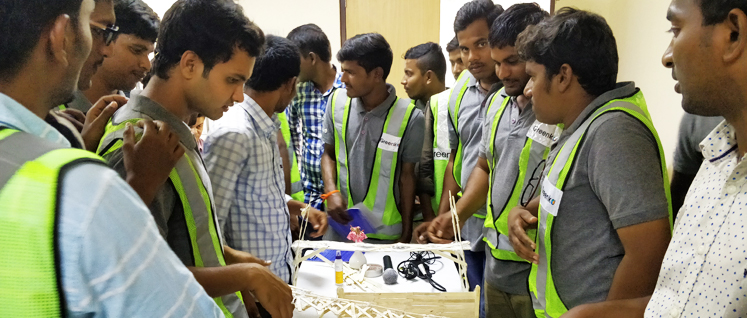
Recognizing the need and urgency, National Institute of Solar Energy(NISE) has launched Suryamitra Skill Development Program in collaboration with State Nodal Agencies at various locations across India. Under this scheme, Greenko has introduced a Solar Skill Development Certification Program for 280 ITI students of the local communities in Kurnool cluster at Ghani Solar Park with a vision to enhance their skills for employability. Greenko has provided employment to over 100 trainees of Suryamitra Skill Development Program.
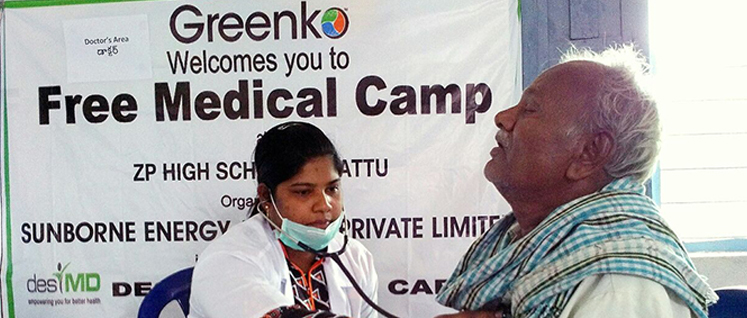
1. Health Camp at Hatkoti Site
2. Eye checkup camp at Palampur Cluster
3. DST Eye Camp
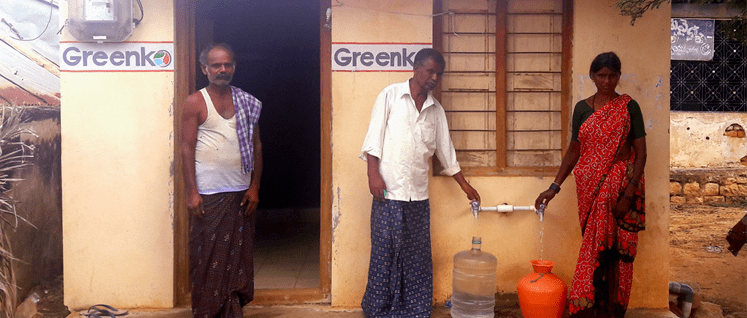
We initiate rural development programs in consultation and coordination with local panchayats. Based on the inputs received from the local stakeholders we design our interventions for rural development projects. After assessing the various short term and long term needs of the local communities, such as:
1. Clean drinking water
2. Availability of infrastructure like roads, street lighting, sanitation facilities etc.
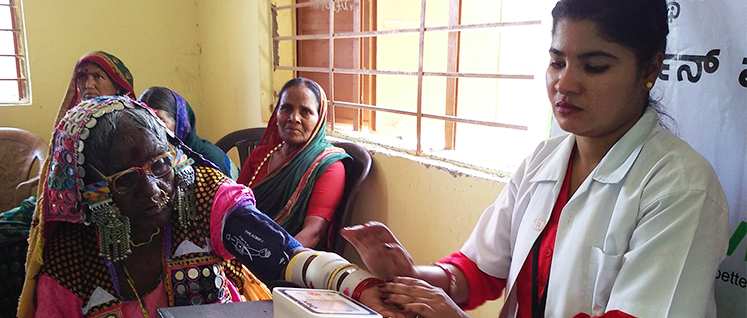
The nature of our operations demands a strong focus on the health and safety of our employees. We aim to regularly enhance our internal safety systems through functional & behavioural training and safety awareness programs, to sensitize our employees about the criticality of safety measures. We have implemented an effective Environment, Health and Safety (EHS) governance by focusing on the core areas as described below.
1. We train our employees/workers regularly to enrich safety awareness and ensure safe working environment at all work locations.
2. We conduct relevant training programs for the executives to enhance their knowledge and skills.
3. We have made a list of Training programs to be conducted in a Calendar Year and provided relevant "Training Modules" to the Executives so as to enable them to organize the training programs in an effective manner.
4. In addition to this, we have circulated soft copies of "Animated Safety Videos" to site teams to be used as resources for the training sessions. Some of our regular in-house training programs are on:
a. GIMS policy, Procedures, code of conduct, EHS Orientation & Toolbox talks.b. Behaviour Based Safety
c. Office Safety & Ergonomic Safety
d. Road Safety (Two / Four-Wheeler)
e. Electrical safety
f. ERP Heat Stress Management
g. Fire Safety & Housekeeping
h. Awareness on First Aid Treatment
i. EHS Aspects and Impacts
j. Conservation of Resources
The Corporate Social Responsibility at the Pinnapuram Integrated Renewable Energy Project (IREP) is being implemented since April 2022 covering the adjacent villages of the entire project area.
Education Initiatives
Some of the educational interventions undertaken during the reporting period is presented below:
- Construction of Compound Walls.
- Construction of Boys' and Girls Toilets
- Construction of Mid-Day Meals Centers.
- Construction of Multipurpose Sheds.
- Providing Drinking water Facility; &
- Improve classroom infrastructure
Support for improving the quality of education
- Providing additional teachers
- Conducting school-level educational competitions
- Encourage activity-based learning through creative activities such as drawing competitions
- Provide Smart Class Systems
Support the vulnerable children
- Provide School uniforms.
- Provide study Notebooks; &
- Provide scholarships to less privileged
Encourage local sports and cultural activity
- Provide play equipment to the primary schools.
- Support the local sports teams.
- Support the School level annual sports functions; &
- Support the school-level cultural activity
Health Initiatives
Some of the health initiatives implemented for the neighboring community at our operational presence for the reporting period is presented below:
- Conducting General Community Health Camps.
- Conducting Specialised Diagnostic Screening and Treatment (DST) Eye Camps; &
- Undertaking Health Awareness Camps
Rural Development Initiatives
Some of the initiatives implemented under the rural development thrust area for the local community at our operational presence for the reporting period is presented below:
- Providing Reverse Osmosis (RO) Plant for Drinking Water at Village Level.
- Providing Open well and Borewell for drinking water.
- Providing Street lighting Facility at Village Level.
- Construction of Community toilets at Village level.
- Construction and repair of roads and Bus Shelters; &
- Construction and repair of existing drinking water systems
Skill Development Initiatives
- Skill Training to local youth for employment through Skill Development Center
- Training in Computer Skills for educated youth through Computer Training Center
Environment Initiatives
Conducting Plantation drives of local plant species
- Conducting Environmental awareness campaigns in schools.
- Local Bio-Diversity Conservation
- Protect the local heritage sites
Other Community Welfare Activity
- Promotinglocal Cultural Activity,
- National integration activity,
- Supporting local traditional festivals and fairs
ENVIRONMENTAL INITIATIVES
Greenko Group is driven towards contributing to the National issues and to ensure that the group’s activities respect, promote and advance internationally recognized environmental principles & commitments, Greenko has put in place Greenko Integrated Management Systems (GIMS) and corporate EHS functions. For the purpose of monitoring, we have put in Environmental management systems and have also gotten Greenko projects certified under ISO 14001:2015 standard for "Operation and Maintenance" activities.
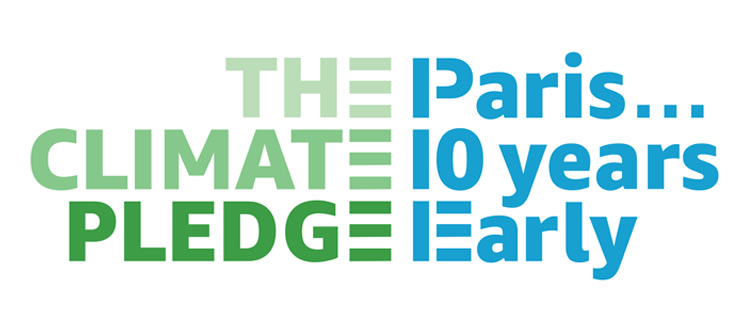
Greenko has become signatory to “The Climate Pledge” today and is joining more than 200 companies who have pledged to achieve net-zero carbon by 2040. Today’s announcement responds to the findings of the latest report from the United Nations’ Intergovernmental Panel on Climate Change (IPCC), which underscores the need for increased urgency in addressing the climate crisis. Unless there are immediate, rapid, and large-scale reductions in greenhouse gas emissions, limiting warming to close to 1.5 degrees Celsius or even 2 degrees Celsius will be out of reach.
Businesses have long contributed to the effects of climate change, but deep cuts in emissions of greenhouse gases could stabilize increasing temperatures. This is why urgent, ambitious action by companies around the world is needed. The 200 plus Climate Pledge signatories, which have committed to net-zero carbon by 2040 or sooner, are uniquely positioned to rise to the challenge of addressing climate change and helping to create the low-carbon economy of the future.
The current Climate Pledge signatories are expected to collectively mitigate 1.98 billion metric tons (BMT) of carbon emissions from a 2020 baseline, representing 5.4% of global annual emissions —demonstrating the collective impact The Climate Pledge is having in addressing climate change and prompting more action to tackle the climate crisis.
Signatories to The Climate Pledge agree to:
● Measure and report greenhouse gas emissions on a regular basis.
● Implement decarbonization strategies in line with the Paris Agreement through real business changes and innovations, including efficiency improvements, renewable energy, materials reductions, and other carbon emission elimination strategies.
Neutralize any remaining emissions with additional, quantifiable, real, permanent, and socially beneficial offsets to achieve net-zero annual carbon emissions by 2040—a decade ahead of the Paris Agreement’s goal of 2050.
“As a leading renewable energy company with an operational portfolio of 7.5 GW and a pipeline of 15 GW of wind, solar, hydro, and energy storage assets spread across 15 states in India, Greenko is proud to be joining The Climate Pledge and making the commitment to achieve net zero carbon emissions by 2040 — 10 years ahead of the Paris Agreement. Greenko will continue to build upon its hallmark of environmental stewardship, through greenhouse gas mitigation, climate risk management, conservation and restoration of habitats, as well as circular economic approaches,” said Anil Kumar Chalamalasetty, Founder, CEO and MD, Greenko Group.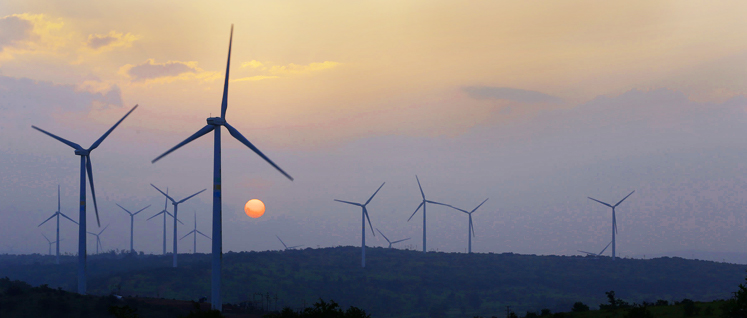
Greenhouse gases contribute to the acceleration and aggravation of climate change and its impact. Thus, as responsible businesses, we monitor and make efforts to reduce the GHG emissions from business operations. The conference of parties (COP) to UNFCCC have agreed on limiting the global temperature rise to below 1.5-2°C compared to pre-industrial temperatures. Traditionally, economic development has been closely correlated to a higher energy consumption and therefore the increase in GHG emissions. Building a de-risked portfolio of wind, solar, hydropower and clean energy assets within India, Greenko intends to increase its installed capacity for integrated renewable energy by developing greenfield assets and thereby reduce the GHG emissions.
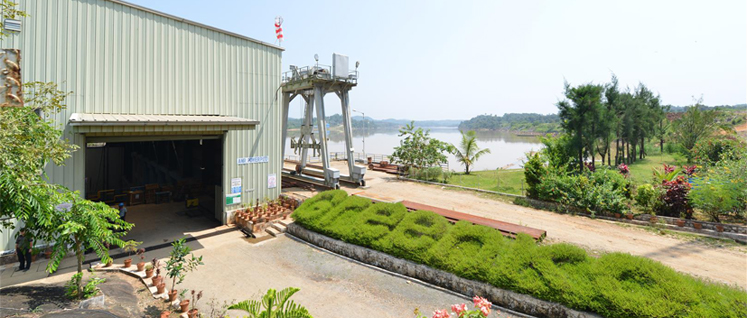
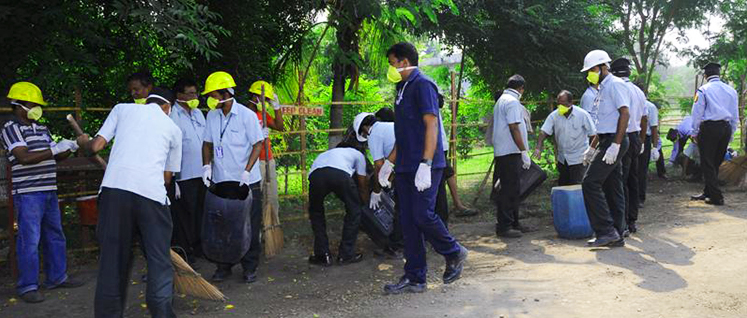
Greenko Group's management of wastes is based on its Environment and Social Management System that establishes practices to meet the legal requirements along with reducing or avoiding generation of wastes and to reuse or recycle whenever possible. The system governs identification of the waste streams, their classification, manner of collection, transport and appropriate final disposal. Greenko carries out continuous monitoring of generation, storage and allocation of wastes from its contractors and vendors alike. The group conducts an Environmental Education Program for employees and partners, which includes raising awareness about environmental issues, with a focus on reduction, reusing and recycling of waste.
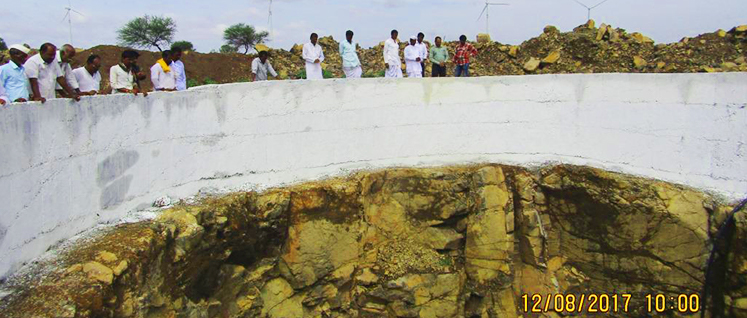
Most of our plants are located and designed to use water from surface water sources. As water is critical to the environment in Indian geography, water management is very critical and material to our operations. None of our plants/projects create any significant water stress in the areas where we operate.
Water management initiatives
1. Sprinkler & dripping system has been installed and maintained in the power house and staff quarters
2. RO plant waste water is reused for gardening purpose
3. Rain Water Harvesting System - All the Rainwater is diverted through drains to rainwater collection pit and that water is reused for gardening purposes.

Greenko Group believes that the absence of absolute scientific certainty should not be a reason for postponing effective and economically viable measures to prevent the threat of serious or irreversible damage to the environment or to human health in the procedures for prior license, installation and operation. The Group is cognizant of the importance of native flora and fauna population in the areas adjoining the Greenko project. Greenko carries out Environmental and Social Impact Assessment (ESIA) study prior to the commencement of any operations, in line with the requirements of ten Equator Principles; eight International Finance Corporation (IFC) Social & Environmental Sustainability Performance Standards (PS); and IFC Environment, Health and Safety (EHS) Guidelines for Renewable Energy Projects.
We have been investing towards environmental conservation/ protection initiatives in the following areas:
1. IMS Certifications (EMS, OHSAS, QMS)
2. Environmental education and training
3. Green Purchases
4. Preservation of Biodiversity
5. Environmental Monitoring Equipment
6. Impact Assessment Studies
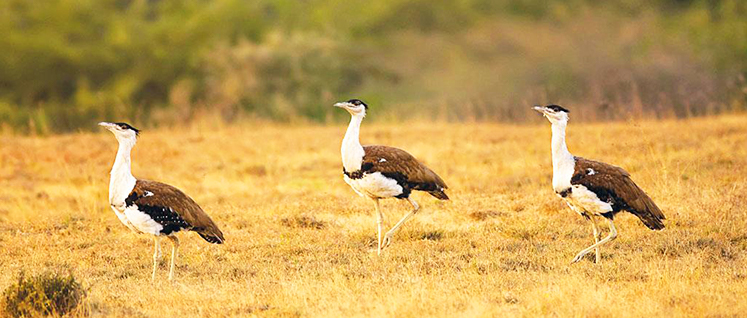
Greenko group has submitted a plan to the forest department to adopt the Rollapadu bird sanctuary and will begin the work very soon. The conservation project, besides other things, would involve:
1. Development of infrastructure for habitat & species conservationa. Bio Fencing along Rollapadu sanctuary boundary
b. Conducting Great Indian Bustard Survey in Satellite Grassland in Kurnool & Anantapur Dist
c. Improvement of European Economic Community at Rollapadu
d. Engaging and associating with NGO's and research institution
a. Unwanted weed, woody growth removal for development of grassland
b. Engaging of 5 Nos. Fire watchers from April to May and January to March every year
a. Adjacent private land shall be acquired to increase the sanctuary size and reducing the public intervention
a. Conducting awareness programs around Rollapadu villages to ensure public support for the cause of conservation
b. Filming a documentary about the great Indian bustard and screening in electronic media and local theatres to improve the awareness on bird and sensing the bird sighting every year across the corridor
a. Providing Solar lights to the Villages adjoining to Sanctuary area
b. Providing Solar Cookers to the Villagers adjoining to Sanctuary area to reduce fuel wood dependency
c. Providing Solar based drinking water pumping system for providing water facilities in adjoining villages near Rollapadu
a. Providing Solar lights near accommodation for visitors
b. Semi-permanent Cottages with attached Bathroom at GIB Wildlife Sanctuary
c. Tented accommodation with attached bath
d. Reception cum Restaurant
e. Battery Operated Vehicles
f. Maintenance of Ecotourism facility including man-power support
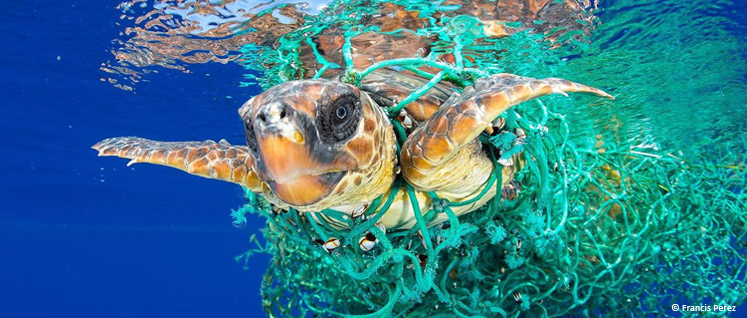
Greenko Group has partnered with WWF-India to “Protect our Ocean Health and Biodiversity from Marine Debris”, with a focus on conservation of the Olive Ridley turtles along the coast of India. The project covers three coastal states, namely, Andhra Pradesh, Kerala and Goa. The project aims to mitigate threats to marine turtles from entanglements in fishing nets with support of fisher communities & through advocacy at a government level. The fisher community is being engaged through workshops and awareness drives to adopt sustainable fishing practices. Consequently, an incentive mechanism will be established to encourage their participation in adopting better practices to reduce turtle bycatch in trawlers and handling of ghost nets.
The activities under the project will be carried out under two broad objectives:
1. To reduce impacts of ‘ghost’ fishing gears on threatened species including Olive Ridley turtles● Surveying fishing communities, spatial mapping to identify marine debris hotspots along coastline.
● Identifying reliable change agents within fishing communities, planning a monitoring programme with best practices and data sharing, providing on ground support for participating community members.
● Analysing data from initial surveys and mapping to identify priority areas and mitigation practices.
● Conducting workshops & awareness programmes to enhance understanding for various stakeholders.
● Engaging with government agencies to help promote appropriate policies for sustainable fishing practices.
● Developing innovative partnerships to create financial incentives for fisher communities.
● Establishing a field team, conducting training, standardising protocol and providing field logistics sorted for monitoring.
● Stakeholder workshops for the fisher community to agree for a trial run, carry out a Turtle Excluder Device (TED) trial run using established protocol, carry out awareness and training sessions on increasing the efficiency of TEDs and overcoming all misconceptions associated with it within the community.
● Engaging with government agencies for supporting TED implementation.
● Exploring incentive mechanisms to promote the uptake and use of TEDs among local communities.
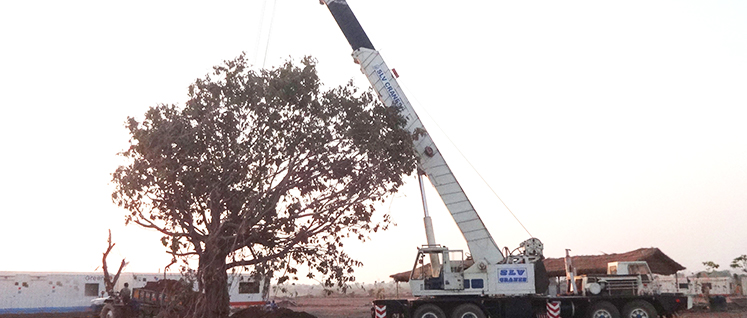
Trees are a crucial part of our ecosystem, and play a vital role in maintaining the biodiversity of an area. In order to facilitate the construction of Ghani Solar Park on a large scale, Greenko has adopted the latest technology to conserve trees within the project sites. The trees were taken out from project site and replanted at planned locations and along the roads within the project site. The average age of the trees replanted is above 50 years.
We have adopted the following steps during the process of transplantation.
1. Soil sampling and site selection
2. Root pruning and tree packing
3. Transplantation of trees
4. Mechanical support and root pruning
5. Post-transplantation treatment
STATUTORY CLEARANCES
Greenko AP01 IREP Environmental Compliance June 2025
Greenko MP01 IREP Environmental Compliance June 2025
Greenko KA01 IREP Environmental Compliance June 2025
Saundatti PSP - Forest Clearance Stage-II
Saundatti PSP - Environment Clearance
MP30 Gandhi Sagar PSP - Forest Clearance Stage-II
MP 30 Gandhi Sagar PSP - Environmental Clearance-Amendment
MP 30 Gandhi Sagar PSP - Environmental Clearance
















